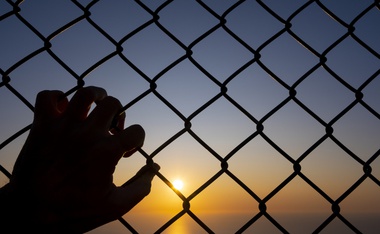The views expressed in our content reflect individual perspectives and do not represent the authoritative views of the Baha'i Faith.
When you hear the words “refugee” or “migrant,” what immediately comes to mind? Do you think of a poor immigrant crossing into another country – or do you think of Christ?
Yes, Christ’s family were refugees and migrants. Joseph and Mary, his parents, fled Bethlehem after Joseph’s dream about King Herod’s dictate to kill all male infants. To save their newborn son Jesus, they entered Egypt as poor migrants.
In fact, many of the great prophets, holy messengers, and founders of the world’s religions were once refugees — impoverished exiles who taught, and relied on, human kindness.
RELATED: The Way to Welcome Immigrants and Strangers
Consider the enormous difficulties they endured: abused, tortured, exiled from their native lands, made to wander in foreign places without support or sustenance, persecuted, jailed, and even executed, God’s messengers suffered as migrants and refugees.
Abraham, fleeing from a severe famine in his homeland of Canaan and banished by the king, migrated to Egypt. Buddha left his royal life and migrated to Rajagaha, where he became a mendicant, a homeless man begging for alms in the street. Baha’u’llah, the prophet and founder of the Baha’i Faith, was forcibly exiled from Persia, his homeland, into decades of imprisonment – all for teaching his new Faith.
These prophets and many others, the Baha’i teachings explain, became exiles, refugees, and migrants. Abdu’l-Baha, the son and successor of Baha’u’llah, spoke about this reality in a talk he gave at the All Souls Unitarian Church in New York City in 1912:
Moses was persecuted and driven out into the desert, Abraham was banished, Muhammad took refuge in caves, the Bab was killed and Baha’u’llah was exiled and imprisoned forty years. Yet all of Them desired fellowship and love among men. They endured hardships, suffered persecution and death for our sakes that we might be taught to love one another and be united and affiliated instead of discordant and at variance. Enough of these long centuries which have brought such vicissitudes and hardships into the world through strife and hatred. Now in this radiant century let us try to do the will of God that we may be rescued from these things of darkness and come forth into the boundless illumination of heaven, shunning division and welcoming the divine oneness of humanity.
Could their experiences of privation, persecution, and great difficulty as strangers in a strange land have possibly helped all of the prophets develop enormous empathy for the displaced? The Baha’i teachings certainly reflect that high level of empathy. Abdu’l-Baha said: “Be always kind to everyone and a refuge for those who are without shelter.” In a talk he gave in Paris, he added:
… strive that your actions day by day may be beautiful prayers. Turn towards God, and seek always to do that which is right and noble. Enrich the poor, raise the fallen, comfort the sorrowful, bring healing to the sick, reassure the fearful, rescue the oppressed, bring hope to the hopeless, shelter the destitute!
You will find these same noble aims of universal love and kindness repeated in the scriptures of all the great global religions. Their teachings urge us to see exiles, migrants, and refugees as human beings — not as others, foreigners, strangers, or usurpers, but as fellow souls who need our help. In another talk he gave to a European audience in Paris, Abdu’l-Baha said:
Let not conventionality cause you to seem cold and unsympathetic when you meet strange people from other countries. Do not look at them as though you suspected them of being evil-doers, thieves and boors. You think it necessary to be very careful, not to expose yourselves to the risk of making acquaintance with such, possibly, undesirable people.
I ask you not to think only of yourselves. Be kind to the strangers, whether come they from Turkey, Japan, Persia, Russia, China or any other country in the world.
Help to make them feel at home; find out where they are staying, ask if you may render them any service; try to make their lives a little happier.
In this way, even if, sometimes, what you at first suspected should be true, still go out of your way to be kind to them — this kindness will help them to become better.
After all, why should any foreign people be treated as strangers? …
Put into practice the Teaching of Baha’u’llah, that of kindness to all nations. Do not be content with showing friendship in words alone, let your heart burn with loving kindness for all who may cross your path.
RELATED: When Immigrants Move In: It’s All About Service
Among Baha’is, all consultation on difficult social issues like immigration starts with identifying the spiritual principles involved. These universal spiritual principles — the oneness of the human race; the consideration of the whole Earth as one country; kindness and compassion to all regardless of their customs, creed or culture — urge us to offer love, service, and shelter to the exiled, the homeless, and the immigrant.
When we live by those principles, we can all do our best to extend an understanding hand to those we meet personally — but what about the policies of our countries? How can we best influence the immigration policies and practices of our various nations so they begin to reflect a more spiritual reality?
We can best serve our countries, the Baha’i teachings say, by applying the principle of federalism to the whole world. In the final essay in this series, we’ll explore how that might be possible.
















Comments
Sign in or create an account
Continue with Googleor